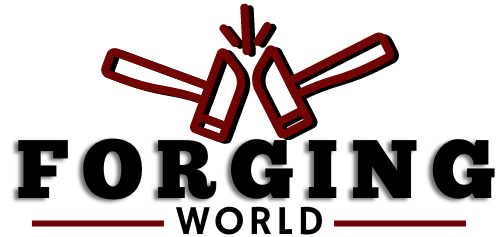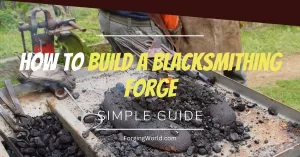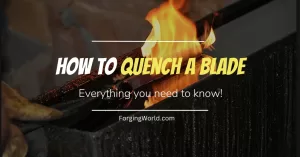As we were finishing forging some Damascus, we decided to write an article about which type of steel is best for making Damascus steel.
So which are the best steels for making Damascus blade?
High carbon steel like 1084/1095 and 15n20 high-nickel steel are the two most common types of steel for making Damascus. Both seem to weld together properly which makes them a great mix for making Damascus.
If this is your first time making Damascus, 1084/1095 and 15n20 steel mix is ideal. On the other hand, if you are making a Damascus kitchen knife, stainless steel is recommended, like VG1, VG2, VG10, AUS8, and AUS10.
Note that there are countless different possibilities for forging Damascus. Next, we will talk more about Damascus and other great combination options. Also, some of the most popular questions related to Damascus will be answered.
What Is Damascus Steel?
Damascus is a type of steel containing a wavy or watery pattern. The color is a contrast of light and dark metal color. It is very hard and flexible.
You can choose between two types of Damascus steel:
Damascus steel is known for maintaining a sharp edge.
In the past, blades made from Damascus were superior to those which were formed from iron. Choosing the right steel for making a Damascus blade is crucial. Anything from two to all to five different sheets of steel is used for this process. If you are a beginner, we recommend mixing only 2.
Cast Damascus was originally cast from wootz, steel which was originally made in India. The technique for producing wootz was lost in the 18th century. Up to today, people were trying to replicate cast Damascus. Unfortunately, no one made anything similar.
Pattern-welded variation is today considered a modern type of Damascus but it is not the original one. It is made by placing a few layers of steel on top of each other and forging them together to produce a welded bond. Keep in mind that you need a forge capable of heating it at around 2500°F (1371°C).
High-Carbon Steel in Damascus
If the knife is not hard, it is useless for most purposes. The more carbon steel has, the harder it will be therefore carbon is considered the single most important element in steel composition. It is inevitable for producing important microstructures of steel, including cementite, pearlite, and martensite.
If steel contains around 1.5% of carbon, wear resistance is noticeably increased which is extremely important for making a Damascus blade. Related to carbon content, steels are divided into 3 groups: low-carbon steels, medium-carbon steels, and high-carbon steels. For purposes of making Damascus blade, high-carbon steels are primarily used.
On the other hand, the larger carbon content is brittleness, and weldability decreases due to the formation of a chemical micro-structure called Martensite.
High-Nickel Steel in Damascus
Nickel steels are a good option to mix with high-carbon steel to produce Damascus blades. They have good strength and toughness. Also, when etched, high nickel content yields excellent contrast which makes it ideal for this purpose. Nickel narrows the hardening range but it also lowers the critical range of steel.
These types of steel are usually much finer in structure than ordinary steel. If the nickel content is high enough, the blade is very corrosion-resistant. The content of nickel is usually from 1.5% to 5%. Nickel also increases the elastic limit of steel. High-nickel steels are rust-resistant which makes them ideal for the production of stainless steel. Nickel decreases the level of cracking and distortion during the quenching process.
Nickel is known as a weak hardening agent and it is not commonly used alone in conventional alloy steels. However, if combined with other alloying elements tends to improve toughness.
4 Best Steel for Making Damascus Knife
There are many different types of steel and ways to make Damascus. Now, if we want to make a Damascus blade, we need 2 types of steel: high-carbon steel and high-nickel steel. This combination is ideal for making blades. Blade made out of these 2 plates of steel is incredibly hard and has excellent edge retention.
1084 Steel
1084 steel is one of the simplest steels to heat-treat at home. This is why it is also considered beginner steel. It is a high-carbon steel with a carbon content of 0.8-0.93 %. 1084 steel (Amazon link) also needs less soak time in heat when compared to some other steels. It has decent shock resistance. Because it doesn’t contain chromium, it has low wear resistance.
Manganese content of 0.9% noticeably increases the hardness and brittleness of the steel. In regards to Silicon content, 1084 steel contains 0.5%, which increases strength. Phosphorus content is 0.3 % which also has an impact on the strength of this steel. Lastly, 0.5% of Sulphur increases machinability but on the other hand, also decreases strength.
The hardness of 1084 steel is 50 HRC at 650 °F of heating temperature and 65 HRC at 300 °F. This level of hardness provides excellent edge retention. In terms of corrosion resistance, as we see in the alloying composition, 1084 doesn’t contain chromium, which means it has low corrosion resistance.
Generally, the harder the steel is, the less tough it will be. Knowing that we could say that this steel has a middle level of toughness. While 1084 is definitely not the best high carbon steel for knife making, it will still make an incredible knife with great edge retention. Also, it works beautifully for making Damascus knives, especially when combined with high-Nickle steel.
1095 Steel
1095 steel is by far one of the most popular steels for making good-quality blades. Its carbon content is around 1% which makes it high-carbon steel. 1095 steel is excellent for the hardening process. It is also very durable steel.
1095 steel bars are available on Amazon.
Due to its low levels of manganese, it has a low toughness level. Like 1084, 1095 steel also has great edge retention. It holds edges very well and it is so easy to sharpen. This steel falls in the category of beginner steels, primarily due to its simple heat-treating process.
Even if it is easy to sharpen, 1095 can easily crack if the blade isn’t thick enough. This steel shines nicely, although it doesn’t shine like other stainless steel. Even it doesn’t contain chromium, it can be polished very easily.
1050 Steel
This steel is also very popular in Damascus making. It has a great balance between hardness and toughness which makes it excellent for knife-making purposes.
When compared with previously mentioned steels, 1050 steel has significantly less carbon content, 0.5%. This is why is not hard as other high-carbon steel but it will still make a good knife when mixed with some nickel steel.
It has a similar Manganese content to 1095 steel. Mixing it with 15n20 steel will produce a very nice-looking Damascus knife.
15n20 Steel
15n20 steel is definitely one of the most popular steels for making Damascus knives. Except for being high-nickel steel, it is also considered high-carbon steel due to its carbon content of 0.7-0.9%. It has great toughness, making it an ideal steel to use for Damascus making.
The good thing about this steel is that it has low distortion during heat treatment. In terms of quenching, 15n20 steel should be quenched in oil. Forging is done at 980-1090°C while hardening is at 790-840°C.
Recommended tools for making Damascus:
Damascus Kitchen Knives
If you want to make kitchen knives, Damascus’s recipe will be very different. Damascus kitchen knives are primarily made of stainless steel like VG1, VG2, VG10, AUS8, and AUS10. Stainless steel is the group name of ferrous alloys that are resistant to corrosion. They have a protective layer that prevents the negative impacts of air and moisture.
Stainless steels are primarily made from iron, carbon, and chromium. The last one is the one that distinguishes regular steel from stainless ones. That stainless steel would be considered as such, it must contain at least 10.5% of Chromium. It is the most important alloying element in this group of steels. Chromium gives stainless steel the feature of corrosion resistance.
VG1 steel is Japanese steel that has a higher carbon content than most other VG steel. This steel is the predecessor of VG10. It is very known for its sharpness and hard great edges. Due to the lack of cobalt and vanadium, VG1 steel is more probably to chip.
AUS10 steel is considered the strongest type in the AUS series. It is easy to sharpen and has excellent edge retention. Due to the very high-carbon steel content (1.05%), AUS10 is very hard. Because of its hardness, it is relatively fragile. This is why specific content of nickel, silicon, and manganese is added to the mix. That complete mix of alloying elements now noticeably improves the ductility and elasticity of the steel.
Knowing all that, we can conclude that AUS10 steel is top-quality for making Damascus kitchen knives. You definitely won’t regret buying it.



